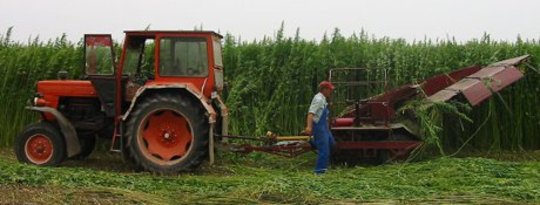 Banned in the US by ignorance or ulterior motives, industrial hemp has huge potential as a bio-fuel.
Banned in the US by ignorance or ulterior motives, industrial hemp has huge potential as a bio-fuel.
Bioenergy and biofuels have an important role to play in lowering the use of carbon-intensive fossil fuels – a point underscored by the IPCC report which confirmed the need for further research to improve such technology.
A key challenge is creating alternative transport fuels, which are currently overwhelmingly fossil-fuel dependent, and responsible for 25% of greenhouse gas emissions in the EU. Of the renewable energy alternatives such as wind, tidal and solar power, it is only non-edible biomass (broadly, any biological matter derived from plants or other organisms) that can offer a low-cost, “drop-in” sustainable transport fuel.
Such a liquid biofuel with a high energy density would fit easily into the enormous global fuel distribution networks that already exist. Other renewables such as wind and solar, though well-suited to powering static homes and industry, would require significant breakthroughs in battery technology before they could compete with gasoline, diesel or liquid biofuels.
With transport and emissions growing, an alternative is needed, fast. Biofuels derived from waste could replace 16%, or 37m tonnes, of oil used by road vehicles in the EU alone by 2030. But history has shown how introducing new and transformative technologies can be slow, especially when they seek to usurp the highly-embedded infrastructure of the status quo.
Wasted Raw Materials Could Produce BioFuel
Each year India produces more than 200m tonnes of inedible agricultural waste such as rice and cotton stalks, unsuitable for either human consumption, animal fodder or bedding. Most is burned illegally to speed up the process of crop rotation. This releases huge quantities carbon dioxide into the atmosphere, and wastes valuable hydrocarbons that could be put to use. Europe produces 900m tonnes of agricultural, forestry and food waste – all are rich in energy-filled sugars.
Which waste stream is used as a raw material feedstock for biofuels will differ from region to region, so a key challenge is to develop the technology that can process biomass with very diverse physical and chemical properties. For example, pine bark, switchgrass, corn husks, and starches. Putting this to use would bring substantial benefits to industry and the economy: instead of paying to burn and bury biomass waste, companies could sell it as the starting point of creating valuable gasoline, diesel and jet fuels.
At the European Bioenergy Research Institute (EBRI) we are working on the engineering necessary. Solutions include thermochemical conversion, for distributed power generation such as to small farms and telecommunications towers. Thermochemical processes, such as pyrolysis, use heat (rather than burning) to force a chemical reaction. This can be dramatically accelerated and steered by the use of catalysts to lower the barriers to chemical bond breaking.
At high temperatures, the chemical bonds between carbon, hydrogen and oxygen atoms in biomass break. The products include a solid, called biochar (like charcoal, but not derived from coal), which is used as a soil enhancer or a solid heating fuel. It also produces a liquid that can be used as a biodiesel to power combustion engines, and a small amount of biogas that can be burned to sustain the pyrolysis heat reaction, introducing a degree of self-sufficiency that reduces the overall cost of the process.
Similar approaches pursued by private and state-funded businesses worldwide could deliver a double whammy of eliminating the carbon dioxide emissions from burning waste and at the same time yielding high energy density fuels. British Airways has this month committed to buy 50,000 tonnes of aircraft jet fuel derived from biowaste to be manufactured at a plant in Thurrock, Essex, as part of its deal with sustainable fuel company Solena. And one of the biggest champions of biofuels is the US military, currently offering US$4 billion in loans to companies able to help commercialise and push forward the technology required.
Modernising Biofuels: More Practical, Economic, and Immediate
It’s important to end society’s dependence on the use of non-renewable, carbon-based fuels. But this cannot be done at the expense of food crops (using corn to create ethanol, for example) or land used for food crops, as was the case with so-called first generation biofuels. The pressure this has put on food security in some parts of the world has blackened biofuels' reputation.
But it’s crucial not to throw the baby out with the bathwater: the IPCC report urges us to explore the potential of all alternative energy sources. Newer, second generation biofuels can use non-edible plants (such as grasses) that can grow on soils that cannot sustain food crops. Better yet, careful selection and processing of waste biomass can accelerate the transition away from fossil fuels – we cannot simply write off biofuels as a credible solution to the world’s future energy needs, as it has been by some. Bioenergy solutions are more practical, economic and immediate than many alternatives.
The authors of the IPCC report are absolutely right to highlight the urgent need to alter policy and investment strategies. Funding agencies, private industry and NGOs must work together to focus research and development efforts in bioenergy, and identify projects that will deliver rapid change, without compromising environmental and farming needs. The clock is ticking.
The above was originally published on The Conversation
EDITOR'S NOTE: Watch the following video that demonstrates a real-life practical solution implemented by teenagers in Rhode Island:
{youtube}fgCevU-HI0Y{/youtube}
New England winters can be harsh, especially for those who can't afford to heat their homes. When she was in fifth grade Cassandra Lin learned that used cooking oil could be converted into cheap, clean-burning biodiesel to heat homes. The same year, 2008, Lin founded Turn Grease Into Fuel (TGIF), a youth group that gets local restaurants to donate their kitchen grease to be recycled and shared with charities that identify families who need heating assistance. So far, Lin's outfit has helped offset more than 2 million pounds of carbon dioxide emissions by promoting the use of biodiesel.
In 2011, Lin and her team drafted a bill that required all businesses in Rhode Island to recycle their waste cooking oil and worked with local legislators to get it approved. To access the bill, click here.
State lawmakers passed the Used Cooking Oil Recycling Act in June 2011 and the law went into effect in January 2012, expanding TGIF's efforts into neighboring communities. The network of local businesses and charities that Lin and her team created is itself a well-oiled machine that addresses the needs of community members and reduces waste and pollution. (More info about Cassandra.)
About the Authors
 Adam Lee is Professor of Sustainable Chemistry at Aston University. Their research focuses on the development of heterogeneous catalysts for sustainable chemical processes, specifically the transformation of renewable and waste biomass into valuable fuels and chemicals.
Adam Lee is Professor of Sustainable Chemistry at Aston University. Their research focuses on the development of heterogeneous catalysts for sustainable chemical processes, specifically the transformation of renewable and waste biomass into valuable fuels and chemicals.
 Karen Wilson is Chair of Catalysis and Research Director of the European Bioenergy Research Institute (EBRI) at Aston University. Prior to this she was a member of the Cardiff Catalysis Institute and was awarded a four year Royal Society Industry fellowship to work with Johnson Matthey on the development of catalysts for biofuel synthesis. She did her postdoctoral research in the Green Chemistry Centre of Excellence at York University (1998-99) and at the University of Cambridge with Professor Richard M Lambert (1996-98).
Karen Wilson is Chair of Catalysis and Research Director of the European Bioenergy Research Institute (EBRI) at Aston University. Prior to this she was a member of the Cardiff Catalysis Institute and was awarded a four year Royal Society Industry fellowship to work with Johnson Matthey on the development of catalysts for biofuel synthesis. She did her postdoctoral research in the Green Chemistry Centre of Excellence at York University (1998-99) and at the University of Cambridge with Professor Richard M Lambert (1996-98).
Recommended book:
Green Wizardry: Conservation, Solar Power, Organic Gardening, and Other Hands-On Skills From the Appropriate Tech Toolkit -- by John Michael Greer
 In ancient times, a wizard was a freelance intellectual whose main stock in trade was good advice, supported by a thorough education in agriculture, navigation, political and military science, languages, commerce, mathematics, medicine, and the natural sciences. This book is a must-read for anyone concerned about decreasing our dependence on an overloaded industrial system and, in a world of serious energy shortages and economic troubles, making life a great deal less traumatic and more livable. From the basic concepts of ecology to a plethora of practical techniques, Green Wizardry is a comprehensive manual for today's wizard-in-training.
In ancient times, a wizard was a freelance intellectual whose main stock in trade was good advice, supported by a thorough education in agriculture, navigation, political and military science, languages, commerce, mathematics, medicine, and the natural sciences. This book is a must-read for anyone concerned about decreasing our dependence on an overloaded industrial system and, in a world of serious energy shortages and economic troubles, making life a great deal less traumatic and more livable. From the basic concepts of ecology to a plethora of practical techniques, Green Wizardry is a comprehensive manual for today's wizard-in-training.
Click here for more info and/or to order this book.























